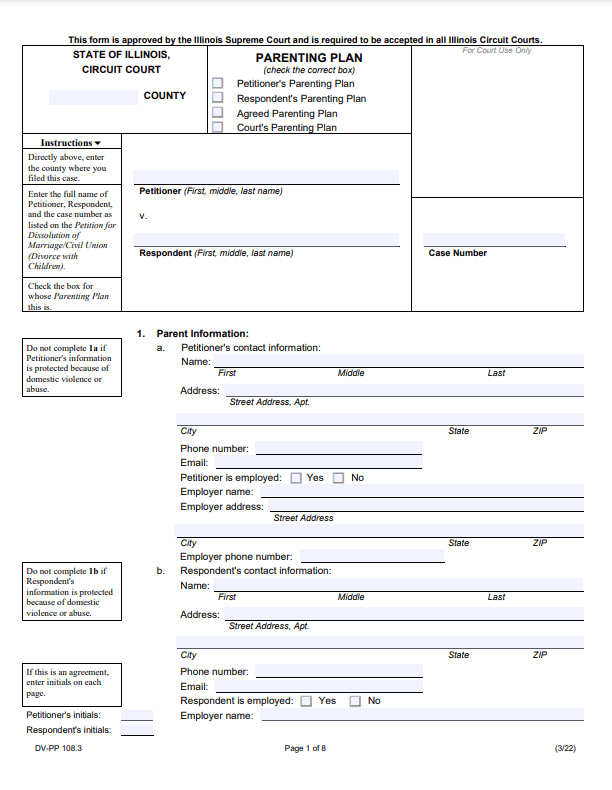When circumstances change and families find themselves in situations where child custody arrangements need to be altered, it’s natural to seek efficient and amicable solutions. Many individuals wonder if it’s possible to sign over custody of a child without going to court. While there are scenarios where custody arrangements can be adjusted without court intervention, it’s essential to understand the legal implications and considerations involved in such decisions.
Soon to be published related articles: Who Has Custody of a Child if There is No Court Order in Illinois? | Can I Take My Child Out of State if There is No Custody Order?

Voluntary Custody Agreements:
In certain cases, parents or legal guardians can work together to create a voluntary custody agreement without going to court. A voluntary custody agreement is a legally binding document that outlines the terms of custody and visitation arrangements. It is important to note that such agreements should still adhere to the best interests of the child and cover critical aspects such as physical custody, legal custody, visitation schedules, and child support.
While you may be able to avoid court in Illinois, it is still important to enlist the help of a qualified family law attorney. At KGN Law Firm we know custody arrangements are not easy. There is a lot to take into account, and these documents must be well drafted if they are to be accepted without modification.
You can also use free online forms to get a good idea of what is included in a voluntary custody agreement like this one.

Benefits of Voluntary Agreements:
- Less Stressful: Voluntary agreements can often be less stressful and adversarial compared to court proceedings. They allow parents to work together to find solutions that best suit their family’s needs.
- Faster Resolution: Since court processes can be time-consuming, a voluntary agreement can expedite the modification process and lead to quicker resolutions.
- Customization: Voluntary agreements provide flexibility to create tailored solutions that work specifically for the family’s circumstances.
- Maintains Control: Parents retain control over the custody arrangement, rather than leaving the decision up to a judge.
When Can a Voluntary Agreement Work?
A voluntary custody agreement can be suitable in scenarios where both parties are willing to cooperate, communicate effectively, and agree on the proposed changes. Some situations that may be conducive to a voluntary agreement include:
- Relocation: If one parent needs to relocate for work or personal reasons, a voluntary agreement can help establish new visitation schedules that accommodate the change.
- Child’s Preferences: If a child expresses a strong preference to live with one parent over the other, a voluntary agreement can formalize this arrangement.
- Changes in Circumstances: Life circumstances, such as changes in work schedules, health issues, or remarriage, can prompt parents to revisit custody arrangements.
- Flexible Schedules: Voluntary agreements can be particularly beneficial when parents have non-traditional work schedules or when they want to maintain a flexible co-parenting arrangement.
Drafting a Voluntary Custody Agreement:
Creating a voluntary custody agreement involves several steps:
- Open Communication: Both parents need to openly discuss their desires, concerns, and expectations for the custody arrangement.
- Negotiation: Collaboratively negotiate the terms of custody, visitation, decision-making responsibilities, and child support if applicable.
- Consultation: It’s advisable to seek legal counsel to ensure the agreement complies with local laws and adequately protects the child’s interests. Courts always put the best interest of children first.
- Documentation: Draft a written agreement that outlines all agreed-upon terms. This document should be clear, comprehensive, and unambiguous.
- Legal Approval: Once both parties are satisfied with the terms, have the agreement reviewed by a lawyer to ensure it’s legally sound.
- Notarization: Some jurisdictions may require notarization or witnesses to validate the agreement’s authenticity.

Enforceability of Voluntary Agreements:
While voluntary custody agreements can be a helpful way to modify custody arrangements without court involvement, they are legally binding documents. If one party fails to adhere to the terms of the agreement, the other party may have legal recourse to seek enforcement through the court system. Therefore, even though the agreement was created outside of court, the court can still play a role in ensuring compliance.
Seeking Legal Guidance:
While voluntary agreements can be effective and practical in many cases, it’s essential to consult with a family law attorney before finalizing any modifications to custody arrangements. An attorney can provide legal advice, ensure the agreement is legally valid, and protect your rights and the best interests of your child.
Conclusion: Can You Sign Over Custody of a Child Without Going to Court in Illinois?
Voluntarily modifying custody arrangements without court involvement can be a viable solution in cases where both parties are willing to cooperate and communicate effectively. Such agreements offer flexibility, speed, and the ability to craft custom solutions that work for the family’s unique circumstances. However, it’s crucial to approach this process with caution and seek legal guidance to ensure that the agreement is legally binding and adheres to local laws. By finding the right balance between flexibility and legality, families can navigate custody modifications while keeping the child’s best interests at the forefront.
MEET WITH AN ILLINOIS FAMILY LAW ATTORNEY TODAY
The Family Law attorneys at Koth Gregory & Nieminski understand that your family is the top priority, which is why we offer SAME-DAY APPOINTMENTS. If you need a divorce or other family law services, you can schedule your first meeting through our online appointment calendar. We look forward to meeting you.
Disclaimer: This article (Can You Sign Over Custody of a Child Without Going to Court in Illinois?) may contain information that is outdated as Illinois law continuously evolves. Meeting with an experienced family law attorney is the best way to ensure you are receiving the most current information about Can You Sign Over Custody of a Child Without Going to Court in Illinois?

Published by Dustin Koth on February 2, 2024
